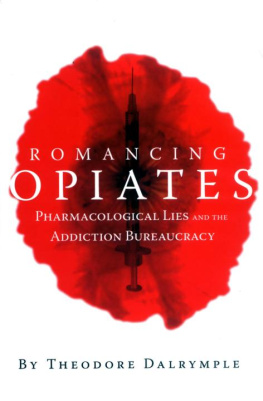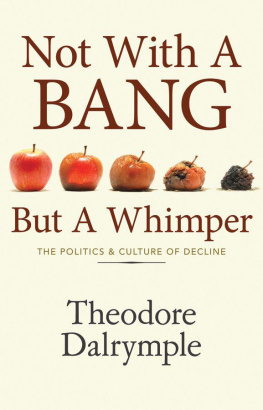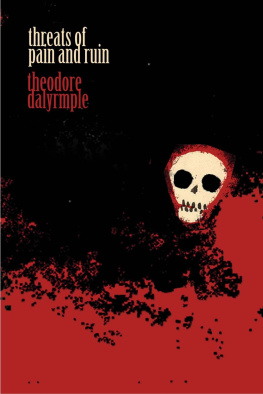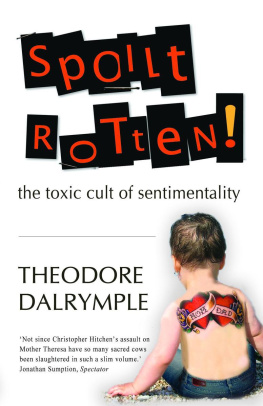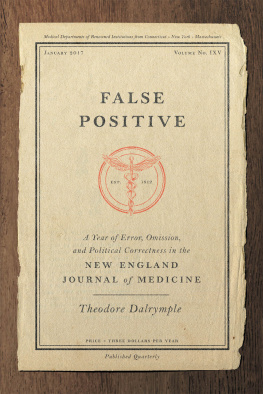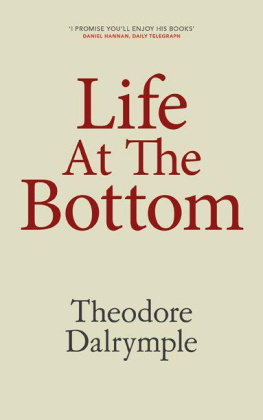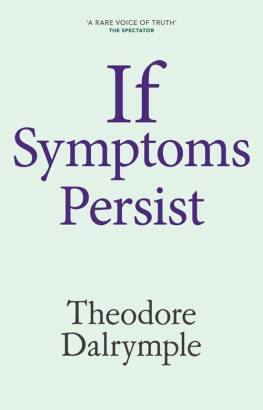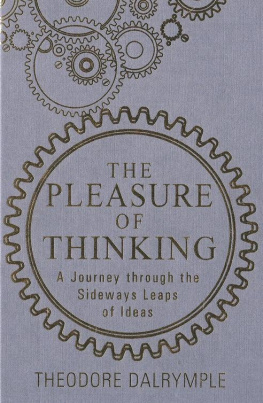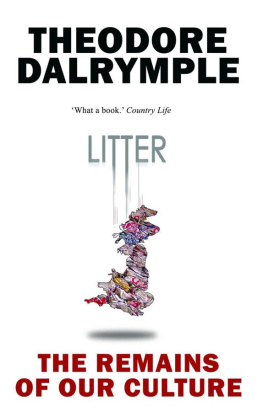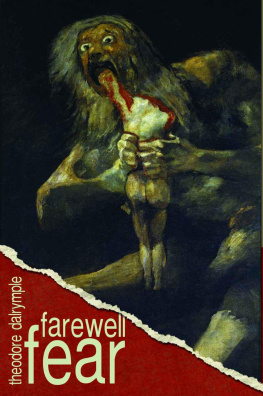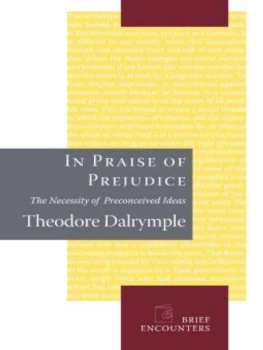Theodore Dalrymple - Romancing Opiates: Pharmacological Lies and the Addiction Bureaucracy
Here you can read online Theodore Dalrymple - Romancing Opiates: Pharmacological Lies and the Addiction Bureaucracy full text of the book (entire story) in english for free. Download pdf and epub, get meaning, cover and reviews about this ebook. year: 2009, genre: Art. Description of the work, (preface) as well as reviews are available. Best literature library LitArk.com created for fans of good reading and offers a wide selection of genres:
Romance novel
Science fiction
Adventure
Detective
Science
History
Home and family
Prose
Art
Politics
Computer
Non-fiction
Religion
Business
Children
Humor
Choose a favorite category and find really read worthwhile books. Enjoy immersion in the world of imagination, feel the emotions of the characters or learn something new for yourself, make an fascinating discovery.
- Book:Romancing Opiates: Pharmacological Lies and the Addiction Bureaucracy
- Author:
- Genre:
- Year:2009
- Rating:3 / 5
- Favourites:Add to favourites
- Your mark:
- 60
- 1
- 2
- 3
- 4
- 5
Romancing Opiates: Pharmacological Lies and the Addiction Bureaucracy: summary, description and annotation
We offer to read an annotation, description, summary or preface (depends on what the author of the book "Romancing Opiates: Pharmacological Lies and the Addiction Bureaucracy" wrote himself). If you haven't found the necessary information about the book — write in the comments, we will try to find it.
Theodore Dalrymple: author's other books
Who wrote Romancing Opiates: Pharmacological Lies and the Addiction Bureaucracy? Find out the surname, the name of the author of the book and a list of all author's works by series.
Romancing Opiates: Pharmacological Lies and the Addiction Bureaucracy — read online for free the complete book (whole text) full work
Below is the text of the book, divided by pages. System saving the place of the last page read, allows you to conveniently read the book "Romancing Opiates: Pharmacological Lies and the Addiction Bureaucracy" online for free, without having to search again every time where you left off. Put a bookmark, and you can go to the page where you finished reading at any time.
Font size:
Interval:
Bookmark:

BY THEODORE DALRYMPLE


To Drs Sally Bradberry, Robin Ferner & Allister Vale The Staff of the West Midlands Poisons Unit

Chapter
Lies! Lies! Lies!
The Literature of Exaggeration and Self-Dramatisation
The Show Must Go On
A Short Anthology of Nonsense

Men, it has been well said, think in herds; it will be seen that they go mad in herds, while they only recover their senses slowly, and one by one.
-Charles Mackay,
Memoirs of Extraordinary Popular Delusions and the Madness of Crowds
Man is the only creature capable of self-destruction, and only man decides in full consciousness to do what is bad, even fatal, for him. Freud's death wish may be mere speculation, an abstract construct conjured from the air, but no one with the slightest acquaintance with the human race could possibly conclude that human beings always pursue their own best interests by means of rational calculation. The primrose path to perdition never ceases to attract.
Not least among the attractions of the primrose path are drugs of abuse. This has always been so and will always be so. The temptation to obscure life's existential difficulties, dissatisfactions, and terrors by means of chemically-induced oblivion has always been, and will always be, great, at least until the meaning of life has been found once and for all. Romancing Opiates draws the appropriate conclusion from this: that addiction to opiates is a pretend rather than a real illness, treatment of which is pretend rather than real treatment. How and why addicts came to lie to doctors, how and why doctors came to return the compliment, and how and why society in general swallowed the lies wholesale, is explored in this book.
Not everyone yields to temptation, however, nor is the proportion of the population that does so constant in time or place. Our underlying anxieties about life may remain always the same (if this were not so, the literature of the past would hardly have any meaning for us), but our response to them is not always the same. It is affected by, among other things, the purpose that we choose to give our lives.
During the past fourteen years, I have worked as a doctor in a large general hospital in a British slum, and in the even larger prison next door. In that time, I have seen addiction to opiatesprincipally heroin-rise from an infrequently encountered problem to a mass phenomenon. Indeed, it has become so widespread that the city council has now put a request that citizens not put their used needles and syringes in the black plastic bags that it distributes to households for garbage collection. And no stairwell in a public housing project is quite complete without the discarded paraphernalia of intravenous drug abuse.
No doubt the sudden increase in the number of heroin abusers in my city was multifactorial, to use the word favored by epidemiologists when the proximate cause of a phenomenon is still unknown to them or anyone else. In all probability, the supply of heroin to the city became much greater and more secure, but no supply would or could have expanded so quickly unless it met its corresponding demand. The demand derived principally from disaffected adolescents and young adults who had been brought up to believe that the immediate satisfaction of personal desires was the highest, indeed the only, good, but whose economic prospects were, relatively speaking, grim, and who would never be able to fulfill their fantasies of a luxurious existence. Such young people were without the spiritual consolation of religion, or the distraction of a deep and satisfying culture. Reverie followed by oblivion was therefore their utopia. Even among young Britons of a higher social class and with better career prospects than the most typical drug addict, it is now common to hear the evening before extolled as a wonderful social event because the person extolling it was so drunk that he is now unable to remember anything whatever about it. This suggests a subBuddhist pessimism about the possibilities of human existence.
Before the sudden expansion of opiate addiction in my city, my acquaintance with the phenomenon was slight, and my interest less. I had known a few addicts in the higher echelons of society, but they had been self-evidently peculiar people even before they had started on their addiction careers. I had very briefly run a drug addiction clinic in a famous university town, at a time when I accepted uncritically what I now know to be myths about opiate addiction. As a person somewhat interested in literature, I had read De Quincey, but he had left little impression upon me apart from an aversion to overwrought prose styles. Opiate addiction seemed to me neither important nor interesting.
But as more and more addicts came to my attention-when I was on duty in the prison, I would see as many as twenty new cases a day-I began to think about it more. The medical perspective, which coincided with their own, that these people were ill and in need of treatment, seemed to me less and less satisfactory or convincing. The number of drug clinics in the city increased dramatically, as did the amount of medication prescribed to addicts, but far from getting better, the problem only worsened.
The condition in which the addicts arrived in the prison was pitiable. I had in my time traveled through many countries devastated by massacre and civil war, but still I was shocked by what I saw. At a time of economic prosperity, there were many young men who were quite literally on the edge of starvation. It would not be an exaggeration, but the plainest of plain description, to say that many of them looked as if they had just been liberated from a concentration camp. Hollow-chested and stick-limbed, they suffered also from vitamin deficiencies. Their tongues were the shiny smooth magenta purple of Vitamin B deficiency; the corners of their mouths were cracked. Their skins were pocked by sores. If any director wanted extras for a film about a concentration camp, he would need to look no further than the daily entrants to British prisons. I used to remark to such young men that if they were released from prison in the condition in which they entered it, everyone would conclude, and rightly, that we were running not a prison but a concentration camp. Therefore, I said, it was only reasonable to conclude that, for them, freedom was a concentration camp; their own desires acted as the concen tration camp guards. Badly educated as they were, lacking almost all knowledge of history or interest in current affairs, not a single one of them ever failed to understand what I meant, and they always laughed; they agreed with what I said. Freedom was bad for them, because they did not know what to do with it.
Font size:
Interval:
Bookmark:
Similar books «Romancing Opiates: Pharmacological Lies and the Addiction Bureaucracy»
Look at similar books to Romancing Opiates: Pharmacological Lies and the Addiction Bureaucracy. We have selected literature similar in name and meaning in the hope of providing readers with more options to find new, interesting, not yet read works.
Discussion, reviews of the book Romancing Opiates: Pharmacological Lies and the Addiction Bureaucracy and just readers' own opinions. Leave your comments, write what you think about the work, its meaning or the main characters. Specify what exactly you liked and what you didn't like, and why you think so.

